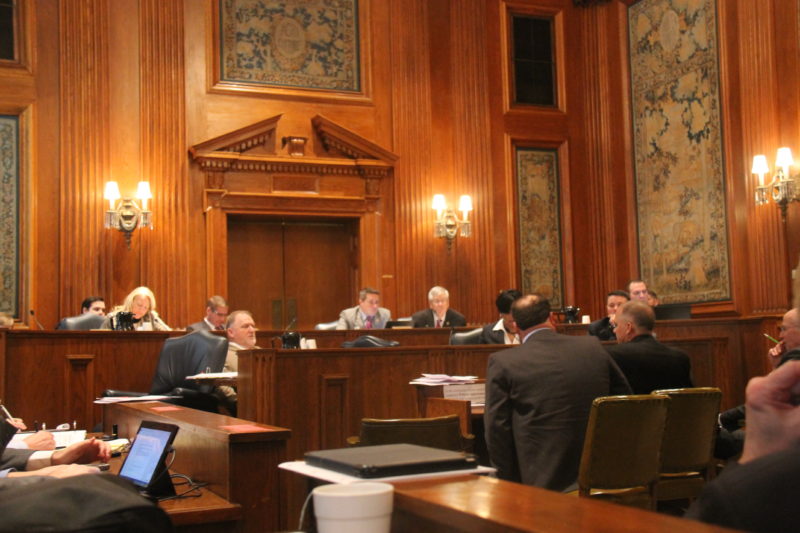Opponents call Emery’s utility bill ‘a solution without a problem’
JEFFERSON CITY, Mo. – The Senate Lounge was filled Wednesday afternoon with a number of stakeholders hoping to testify before the Committee on Commerce, Consumer Protection, Energy and the Environment’s hearing on Senate Bill 190.
SB 190, sponsored by Sen. Ed Emery, R-Lamar, centers on the issue of rate making for public utilities and would establish the “Missouri Economic Development and Infrastructure Investment Act”.
The proposed piece of legislation looks to revitalize Missouri’s aging utility infrastructure by modernizing the grid. Emery says that the state has fallen behind other states’ utility mechanisms, who have changed their regulatory models to meet that of the new technology.
To support the costs of bringing Missouri’s infrastructure up to the new technology standards, the bill includes a provision which would reform regulations on rate adjustment mechanisms. Several of Missouri’s utility companies came forward in support of the legislation Wednesday.
Ameren wants to launch an infrastructure improvement plan spanning over five years. The utility company estimated it would cost $1 billion, another $1 per month for the average customer.
The goal is to share the burden of the costs for grid modernization among the consumers and the utilities. Proponents of SB 190 pointed to aging substations, installed decades ago, and the costs of maintaining them to support the claims for the infrastructure upgrades.
“Missouri has a lot of old electrical infrastructure, a lot of it was put in place when my parents were children,” Brydon Ross, Vice President of State Affairs for the Consumer Energy Alliance, said. “We need to have a forward-looking rate-making policy to plan for the future. We’re using the policies of yesterday to address the challenges of tomorrow.”
But they also urged the committee to consider the benefits of implementing a modernized grid, such as more consumer control, more accurate billing, and less time spent to fix outages.
But opponents of the bill came in numbers matching the utility companies and supporters, arguing the legislation will only raise costs for consumers and continually line the pockets of the utility companies with more profit, and potentially take power from Missouri’s Public Service Commission.
Sen. Gary Romine, R-Farmington, is a member of the committee, and he calls the legislation a tax hike. Romine also led a stall on last year’s version of the bill in the Senate towards the end of session, effectively killing the measure.
“It’s taking money from my constituents to pay for infrastructure,” he said.
Romine also slammed Ameren for contracting with 40 lobbyists this year on this particular issue.
“Missouri utilities have a strong financial condition,” David Woodsmall, executive director of the Midwest Energy Consumer Group (MECG), said. “This sounds like a solution without a problem.”
Opponents further claim that there is no need for grid modernization, saying that the current systems have performed adequately.
Woodsmall pointed to the fact that Ameren Missouri received the J.D. Power award for the highest ranking among large Midwest utilities for overall customer satisfaction.
The argument against that line of thought is one that Allan Connolly warns against.
Connolly is the CEO and president of Aclara Technologies, LLC, the company that Ameren would be working with if the approval for the investment is given. He says that while the system is not broken, when -not ‘if’- it breaks, it will be a major issue.
“The longer we wait, the more expensive it’s going to be,” he said. “We’re asking the grids to do a lot more. The push for more distributive energy is going to happen, and that puts more stress on the grid. It’s definitely one of those investments that have to happen before catastrophe hits.”
“It’s not just efficiency, it’s safety as well,” he added. Connolly says that the technology in question would not only allow the companies to more accurately pinpoint the location of the outage issues but potentially even predict issues before they happen. That, in turn, could mean fewer crews being sent out in severe weather looking for the source of an outage.
Another facet to the safety issue concerns about cybersecurity. Modernizing the grid would mean more digitalization, which opens it up to more potential attacks.
“There’s a fear about cybersecurity, so modernizing the grid is very, very critical,” David Owens, Executive Vice President, Business Operations Group and Regulatory Affairs, of the Edison Electric Institute (EEI), said. “We have to make those investments so that the grid has resiliency, reliability, and can be protected against physical and cyber intrusions. And that’s really what SB 190 is all about.”
The newer grids have become a more open platform for a broad array of technology. Owens said that 70 cities already using these grids to become smarter, modernizing the technology they’re using to integrate transportation, energy, and water through the grid. And with that increased access, the potential for hacking attacks increases.
“These are extraordinary times, and extraordinary measures must take place,” Irl Scissors of Gateway Government Relations said. “That’s what part of this bill does. It allows for significant investments to secure and protect the grid from outside threats, cyber hacks, etc. Utilities and other Missouri industries have to stay ahead of the game.”
Owens says that’s why monitors, sensors, and automated controls are utilized, with the sole purpose of keeping a constant eye on everything.
While both sides gave testimony in Wednesday’s hearing, the time constraints left much of the witness testimony unheard.
As of right now, the legislation awaits a vote from the committee, but the chairman could decide to return to hear more testimony if he deems it necessary.
Benjamin Peters was a reporter for The Missouri Times and Missouri Times Magazine and also produced the #MoLeg Podcast. He joined The Missouri Times in 2016 after working as a sports editor and TV news producer in mid-Missouri. Benjamin is a graduate of Missouri State University in Springfield.










